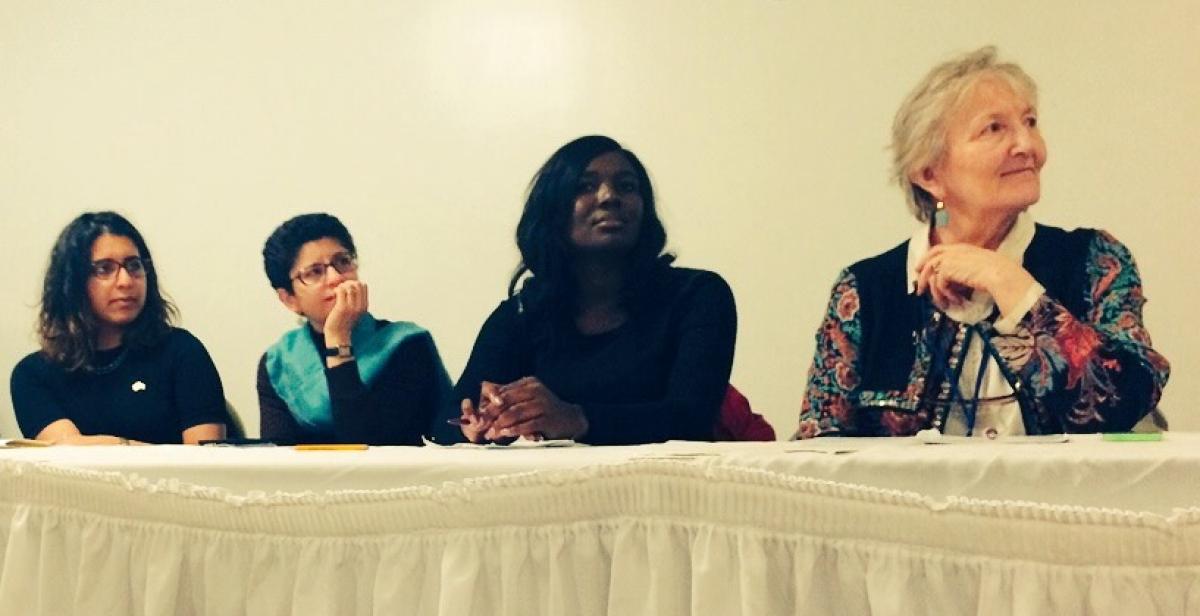Progressio’s parallel event at the 59 UN-Commission on the status of Women (CSW) that took place in New York from 9-20 March 2015 was titled 'Given the complex interplay between social norms, religious beliefs and human rights around the world, how can we advance women’s and girls' Sexual and Reproductive Health and Rights?.
At the event, we attempted to unfold the complex relationships between social norms, faith and women’ and girls’ sexual and reproductive health and rights – Sexual and Reproductive Health and Rights (SRHR in short) is the source of heated debates amongst faith and religious leaders with many people either having a divided opinion or completely misinformed views about what we are referring to when talking about SRHR issues.
The panellists gave excellent insights, both of a personal and professional nature, to a room full with 70 people. The 1.5 hour session was an eye opener for many and encouraged an inclusive debate raising questions such as: How can we change discriminative and social norms aimed at young women and girls? Is it enough to use the positive elements of religions to empower women? Can we use legal and human rights frameworks to complement the efforts made by faith & religious leaders in the pursuit of gender equality? And, what is the relationship between those frameworks and personal beliefs, especially if they differ from what is commonly accepted in communities?
Abigail Matsvai from the Zimbabwean Women's Lawyers Association (ZWLA) shared her knowledge about the importance of including all those in decision making positions to implement change, especially on potentially contentious issues like SRHR. Having a good legislative framework is a good starting point, exemplified with the new Zimbabwean constitution, which eliminated the legal discrimination against women in all areas including early marriages.
In Abigail’s experience, following the introduction of a new legislation, a multi sectorial approach is essential for successfully implementing those changes, which ought to include engaging religious and traditional leaders – they have a strong impact and an influential role in their own communities and a voice that many communities readily accept and listen to.
To illustrate this point Abigail shared an example from Zimbabwe, where in 2013 the Minister of Education’s proposal of introducing sexual education in schools faced resistance from some sectors including community organisations. 'Our values and beliefs schools should not be overridden by the governments and schools', parents complained. That is why it is important to persuade faith and religious leaders of the benefits of providing sexual education for women and young girls in a safe environment, Abigail expressed. The endorsement of faith and religious leaders to ministerial plans are thus crucial for obtaining parental consent towards this proposal and for changing people’s attitudes to this important subject.
Nadia, a 16-year old from the NAWO Youth caucus, spoke from her perspective as a young woman of faith inspired by the values of her Baha'i religion. She stressed that it is not always easy to reconcile the environment in which she engages with friends, and her belief system: ‘ I, like many other young women, have been sucked into the idea of wanting to fit in, to conform in order to be on the team; but sometimes what has been offered to young women is not good for them – for example, conforming to beauty standards that are impossible to attain! It is my religion that helped me to take step back and I am fortunate - being a Baha’i - that my faith has given me some perspective but this has not made me unsusceptible to this. It is also my religion that has made me and many religious young women feel as if the media and your religious beliefs are two colliding worlds. Religion and the way you present yourself on social media are huge aspects of your identity, but a balance between these worlds is possible.’
In spite of her youth and the polemic nature of the subject, Nadia had the confidence to give a strong presentation and share her challenges and strength with us. She is an example of why society should be investing in educating its youth - open and without fear to speak out when something feels wrong. Nadia shared her experiences of being objectified by young boys and men and challenged the mechanic way sexual education is imparted at school, which do not address questions relating to relationships, love and well-being.
Our panellist from UN Population Fund (UNFPA), Ms Azza Karam, spoke about the impossibility of moving forward on gender equality without the engagement with religious leaders. In UNFPA’s experience, almost everywhere in the world, working with faith leaders is imperative because faith based organisations are often health care service providers. Azza explained that the question is not whether we should engage with faith leaders, the question is how. It is important to have available a legal framework that women can resort to if needed; however, in order to make a transformational change on SRHR, leaders should also adopt a strong stance to support sexual and reproductive rights. Azza gave a clear message: 'The challenge which is looming is finding someone who stands by us on sexuality related issues. We don't want to lose the opportunity to stand next to people who are providing services, change behaviour and implement norms. That's our collective challenge if we want to advance the rights of adolescent girls.'
The event highlighted the need for bringing together different perspectives to approach the SRHR agenda in order to advance this subject from a religious, cultural and human rights approach. Our speakers offered views that helped at looking beyond false positions created by misinformation or misunderstandings. Instead our speakers offered the opportunity of creating spaces for sharing and discussing alternative solutions. The open culture of discussions at the CSW is helping to facilitate spaces and it is Progressio’s aim to continue facilitating these opportunities.



